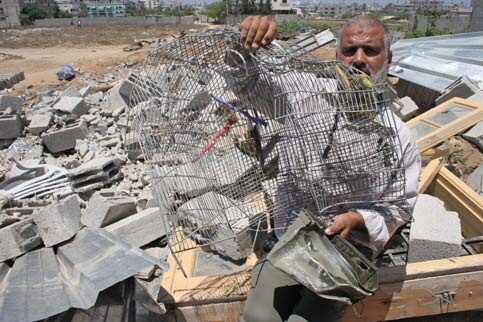Al-HaqAl Mezan Center For Human Rights 31 July 2006

A Palestinian man inspects the rubble of his house, demolished overnight by Israeli troops and tanks in east Gaza City, 28 July 2006. (MaanImages/Thaeer al-Hassany)
Joint Intervention to the President and Vice-Presidents of the Human Rights Council Concerning the Dispatch of a Fact-finding Mission
31 July 2006
Your Excellencies,
During a special session on 6 July this year, the Human Rights Council adopted a resolution (A/HRC/S-1/3), expressing deep concern at the breaches by Israel, the Occupying Power, of international humanitarian law and human rights law in the Occupied Palestinian Territory, and decided to dispatch a fact finding mission.
In the weeks following the adoption of the resolution, Israeli breaches of international law in the Occupied Palestinian Territory have continued unabated, exacting a massive toll on the Palestinian civilian population. Since the beginning of Israel’s offensive in the Gaza Strip on 27 June 2006, 159 Palestinians have been killed, including 31 children. Attacks on civilian infrastructure have further impaired the provision and delivery of essential services, and exacerbated the ongoing humanitarian crisis. Outlined below are specific instances, drawn from a wider pattern of violations, which highlight Israel’s manifest disregard for essential principles of international law.
The dispatch of the fact finding mission is an essential and urgently needed first step towards enforcing Israel’s compliance with international law and protecting the Palestinian civilian population.
The targeting of civilian infrastructure
On 28 June 2006, at 1:27 am, Israeli military planes fired seven missiles at the electricity generator near Al Nusairat Refugee Camp, destroying all six transformers. Power supply was cut off for nearly half the population of the Gaza Strip and remains severely disrupted. At around 1:00 am on 4 July 2006, an Israeli Apache helicopter fired one missile at a student council office of the Islamic University in Gaza City, which caught fire and was completely destroyed. At approximately 1:50 am on 5 July 2006, an Israeli aircraft dropped a bomb on the Dar al-Arqam School in al-Tuffah neighbourhood of Gaza City, destroying a number of classrooms. According to the International Committee of the Red Cross (ICRC), customary international law requires attacks only to be directed against military objectives and not civilian objects. There were no people in the buildings during the attacks, let alone anyone engaged in military activities, and they were therefore not providing an effective contribution to military action at the time of the attacks. Their destruction therefore yielded no legitimate military advantage and was therefore illegal.
Disproportionate use of force
At approximately 2:45 am on 12 July 2006, an Israeli fighter jet dropped two bombs on the house of Dr. Abu Sleima, a lecturer at the Islamic University. He and eight members of his family, including seven children, were killed. At least 37 other civilians were injured and ten adjacent houses were partially destroyed. The Israeli army claimed that the bombing raid targeted Mohammed El-Deif, the commander of the Hamas military wing. According to the ICRC, customary international law prohibits attacks which may be expected to cause incidental loss of civilian life that is excessive in relation to the concrete and direct military advantage anticipated. The attack was allegedly directed at one person but was on a target where it was reasonable to expect a large number of innocent civilians would be present; it was excessive and therefore illegal.
Use of human shields
Israeli forces are known to have used Palestinian civilians as human shields when conducting military operations. This can happen in two different cases: the Israeli army uses a civilian house as a military surveillance point, locking up the residents in certain parts of the house to prevent the house from being attacked; or, the Israeli military invades a house and uses one of the residents of the building to enter the rooms. This provides cover for the Israeli soldiers and is a tactic mostly used in multi-storey buildings, such as incursions that occurred between July 16 and 18 in Beit Hanoun, when the Israeli army invaded 5 houses and 6 civil society organisations. Under Article 28 of the Fourth Geneva Convention, “The presence of a protected person may not be used to render certain points or areas immune from military operations.” The ICRC has further established that the use of human shields is prohibited under customary international humanitarian law.
Attacks on private property
On 24 July 2006, the Israeli military, with the support of the government, declared its intention to “attack weapon storage facilities, including those located in houses.” Such a policy poses grave danger to civilian life and to private property in the vicinity of the attacks. On 24 July 2006 alone, attacks on houses and apartment complexes killed eight civilians, including three children, and injured 38 others, including ten children. Article 53 of the Fourth Geneva Convention prohibits the destruction of private property by the Occupying Power unless “rendered absolutely necessary by military operations.” Under customary international humanitarian law, attacks must at all times distinguish between military objectives and civilian objects. It is highly questionable whether Israel can and will be able to accurately make this distinction in densely populated residential areas.
Israel has, for more than a month, been flagrantly violating international law with total impunity. Determining whether the above, and other violations of international law perpetrated by Israel in the Gaza Strip, constitute war crimes or in certain cases, grave breaches of the Fourth Geneva Convention, requires a sound factual basis. Once this basis is established, Israel’s conduct must be held to the fundamental protections enshrined in international law, and the international community must act to enforce these protections. In light of this, Al-Haq and Al-Mezan call upon the Human Rights Council to:
Al-Haq and Al-Mezan stand willing to assist the Council and the fact finding mission in any way.
Sincerely,
Shawan Jabarin, General Director, Al-Haq
Issam Younis, Director, Al-Mezan
Related Links